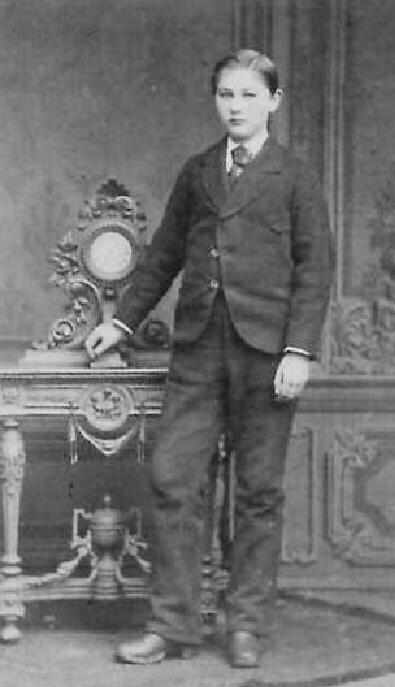
Figure 1.--This is my grandfather, Johann Christoph Friedrich Stueck, who was born in Kassel, Germany, 1865. He was the owner of Stueck's Hotel in Kassel. This picture was taken when he was perhaps 12 years old which would be about 1877.

A HBC reader tells us, "This is my grandfather, Johann Christoph Friedrich Stueck, who was born in Kassel, Germany, 1865. He was the owner of Stueck's Hotel
in Kassel. He later settled in Wiesbaden, where he married Marie Schramm and bought the Beausite Hotel. My nephew in Holland sent me these old pictures of my grand-parents. This picture was taken when he was perhaps 12 years old. I thought it looks interesting as far as the clothes are concerned. My father, Carl Ferdinand Friedrich Stueck was born in Wiesbaden, 1892. He settled in the Netherlands after World War I, where he married my mother, Johanna Betti Riddering. I never knew my grandfather. He died in 1907. I was born 1928 in Utrecht, The Netherlands." Here is a fascinating page which provides some interesting information onGerman-Dutch boys clothing, but also the close relationship between the Dutch and the Germans. The page includes information about the Stueck family.
Historically there has been a close association between the Netherland and Germany. William of Holland emerged as the leader of the opposition to Emperor Frederick Barbarosa in the 13th cenbtury and was elected King of the Germans. Interestingly he led the Catholic faction in alliance with the pope against the emperor. The Netherlands gradually developed outside the structure of the Holy Roman Empire and Dutch developed as separate, albeit closely related language to German. The Protestant Reformation began in Germny, but the Netherlands was one of the key battlefields of the Reformation. The Netherlands in cooperatuoin with German states and England also worked together to limit the expansion of Louis XIV in the 17th and early 18th century. The Dutch by the late 19th century had developed a policy of neutrality which they maintained during World War I, although there was considerable sympathy for the Germans. There were also extenive coimmercial ties between the Netherlands and Germany. The commercial ties led to the development of many Dutch-German marriages and extensive cross-border fasmily ties. After World War I the Dutch supported relief efforts for children in Germany and Austria. The Dutch also granted asylum to Kaiser Wilhelm who lived there until his death in 1941. German policy was very different in World War II. NAZI Germany invaded the Netherlands in May 1940 in cpmplete violation of Dutch neutrality. The Dutch Army surrendered in 7 days after the Luftwaffe terror bombing of Rotterdam. Had the NAZIs won the War, they almost certainly would have incorporated the Netherlands into the Reich. The brutal NAZI occupation chnaged the attitude of many Dutch people concerning the Germans.
A HBC reader tells us, "This is my grandfather, Johann Christoph Friedrich Stueck, who was born in Kassel, Germany, 1865. Unfortunately I don't know too much about him. He was the owner of Stueck's Hotel in Kassel. He later settled in Wiesbaden, where he married Marie Schramm and bought the Beausite Hotel. My nephew in Holland sent me these old pictures of my grand-parents. This picture was taken when he was perhaps 12 years old (figure 1). I never knew my grandfather. He died in 1907. I thought it looks interesting as far as the clothes are concerned." Note the rather modern look of Johann's suit and hair style. He has only buttoned one bitton of his jacket. This may be hapanstance or it could be related to the cutaway jackets worn by boys in which oblt the top button ws buttoned. Also note that Johann wears long pants. Kneepants were in the 1870s becoming increasingly accepted for boys, but they were not yet universal. Many boys even boys younger than Johann wore long pants.
My mother's parents I knew very well. They lived in Holland and had a long life. They had a very interesting life. They met in Romania of all places, emigrated to Argentina, where three of my mother's brothers were born. They settled in Berlin for a while, before returning to the Netherlands.
Our reader tlls us, "My father, Carl Ferdinand Friedrich Stueck was born in Wiesbaden, 1892. My father had no brothers, only a sister who died young. But he had plenty of
cousins in Germany with whom he kept in touch. Most of them were professional
people. My father served in the German army during World War I. He served in occupied Belgium before being sent to Turkey. He spent several years
with the "Suedost Armee" in Turkey. He settled in the Netherlands after the War, where he married my mother, Johanna Betti Riddering. I don't know why he went to Holland. I believe he was offered a job as a car technician."
Our reader tells us, "I was born 1928 in Utrecht, The Netherlands and am thoroughly Dutch. I grew up in a small village in a rural farming community. I can recall the kinds of clothes that we boys wore at the time, including what was worn at out local school. "
Stueck, Rudi. E-mail message, September 8, 2003.
Navigate the Boys' Historical Clothing Web Site:
[Introduction]
[Activities]
[Biographies]
[Chronology]
[Clothing styles]
[Countries]
[Bibliographies]
[Contributions]
[FAQs]
[Glossaries]
[Satellite sites]
[Tools]
[Boys' Clothing Home]
